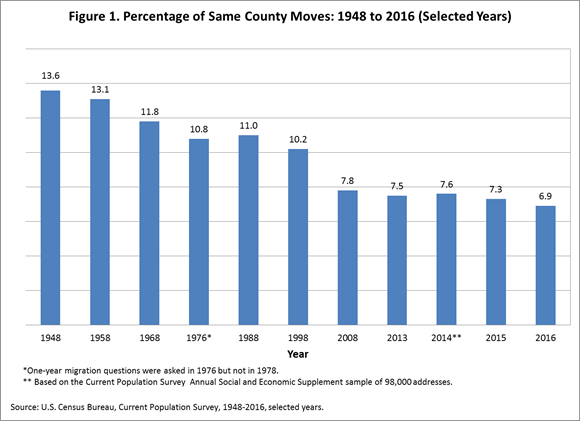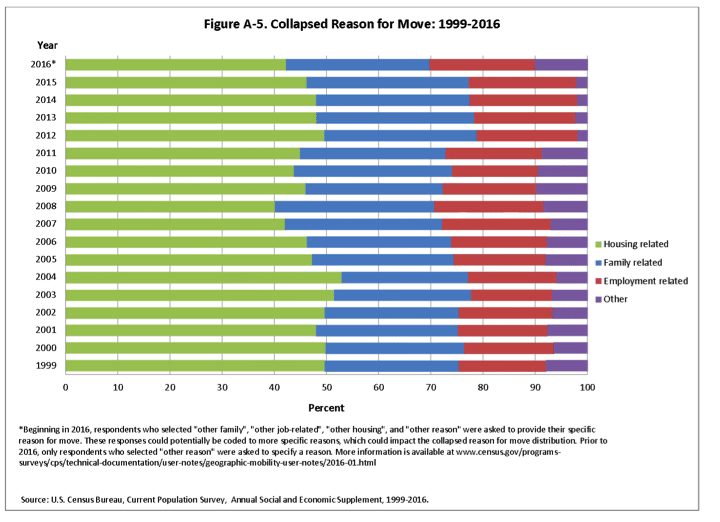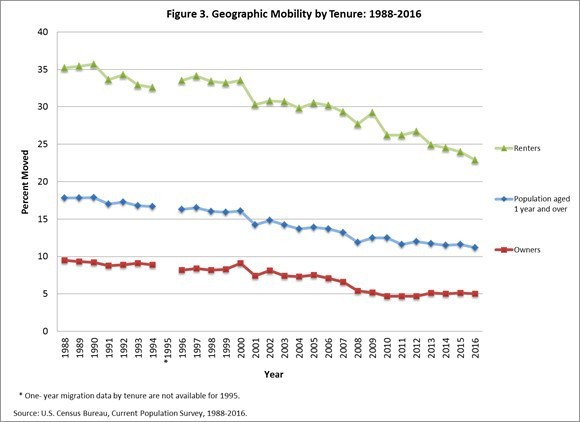Connecting state and local government leaders
The Census reports that a record-low share of Americans are moving. A recent paper suggests government policies might be curbing mobility.
Our ability to move to opportunity—our mobility—is a key factor in our own and our nation’s economic success. But the mobility of Americans has reached record lows, according the latest data from the U.S. Census.
Just slightly more than one in ten Americans (11.2 percent) moved between 2015 and 2016, almost half the 20.2 percent rate back in 1948, when the Census began tracking American mobility. Mobility was once the cornerstone of the American Dream, but today Americans move less often than Canadians, and only a bit more than Finns or Danes.
Both longer and shorter moves have declined over this period. Just 6.9 percent of Americans made shorter moves within the same county, down from 13.6 percent in 1948. The mobility rate for these types of moves plummeted between 1998 and 2008 (with the economic crisis) as the chart below shows, and has declined more slowly ever since.

Longer moves between counties declined from 6.4 percent in 1948 to just 3.9 percent today over the same period.

Why Are Americans Moving Less?
What made this once-restless nation of dreamers and searchers so immobile? There are several reasons.
Our “house passion,” to quote economist Edmund Phelps, is one. Especially in the wake of economic crisis like 2008, people got locked in their homes, unable to sell them and move to economic opportunity.
But that’s not the whole story: The moving slump has also affected renters. Their mobility rate has also declined over the last 30 or so years.

Also, America’s job opportunities have converged in many places, meaning for many Americans it is less likely they will have to move for a job.
But, according to Yale Law Professor David Schleicher, government policy plays a bigger role in American’s declining mobility than we think. In his new study, “Stuck In Place: Law and the Economic Consequences of Residential Stability,” Schleicher identifies several types of policies that limit Americans’ mobility and hold back the economy.
Homeownership Subsidies
The first set of policies are the tremendous subsidies the federal government confers to homeowners through the mortgage tax credit—a direct subsidy of roughly $200 billion a year. And it could run as high as $600 billion when indirect costs are taken into account.As the Census report shows, homeowners are less likely to move than renters, and that has remained the case over the past several decades. Just 5 percent of homeowners moved in 2016, down from 9.5 percent in 1988. The share of renters who moved in 2016 was more than four times higher: 22.9 percent.
Schleicher argues it is high time that the government abandon this subsidy, which not only sacrifices needed tax revenues but inhibits American’s mobility and harms the economy more broadly, something other economists and I have long argued for.
Too Many Land Use Restrictions
Zoning laws, construction caps, and subdivision regulations limit the supply of housing in the most innovative and productive cities, ultimately driving up prices and making it unaffordable for people to move there.The economists Chang-Tai Hsieh of University of Chicago and Enrico Moretti of the University of California at Berkeley estimate that these restrictions have cost the U.S. economy between $1.6 trillion and $2 trillion in lost productivity and output. These cities and metros are also the best opportunities for low-income families and their children to move up the economic ladder.
Schleicher joins a growing chorus of economists who argue it’s time to eliminate these restrictions that generate such large-scale costs for the economy and make large numbers of families worse.
A Boom in Occupational Licensing
Occupational licensing is the third set of policies that restrict the ability of Americans to move. Lawyers, doctors, and a whole host of other professions are licensed at the state level. Schleicher points out that the share of the workforce that falls under some sort of licensing requirement has risen from 5 percent in the 1950s to almost 25 percent in 2008. Such licensing requirements make it hard for people in those professions to move from place to place, where wages are higher or where their services are more needed.
There are other occupational restrictions that limit the ability of workers to move. Public school teachers, for example, build up seniority in their home districts that does not transfer when they move. The differences between eligibility standards for public benefits and location-based subsidies discourage people from moving from one place to another. Place-specific benefits like pensions are another type of policy that discourages residents from packing up.
Lastly, policies like municipal bankruptcy limit the ability for cities to “shrink” gracefully. Schleicher argues that as a failing city's private-sector workers leave, the needs of a city—to provide for recipients of public services, public sector workers, and pensioners—do not necessarily reduce their size. This mismatch leads a city to become insolvent, and the federal government has to respond by providing a bailout to a city that’s losing residents. This means more people that would have left actually stay in that economically failing city.
Why Mobility Matters
I’ve long made the point that residential mobility matters both to the economic prospects of individuals and the economic dynamism of our cities and nation as a whole. In my book Who’s Your City?, I argued that our ability to move was dividing Americans into three classes: the mobile, who derive the benefits of economic dynamism; the stuck, who are trapped in place and unable to move; and the rooted, who are strongly embedded in their communities and choose not to.
Schleicher opens our eyes to the very real policies that contribute to our declining mobility. Some argue that these policies have other benefits—that homeownership promotes retirement saving and community cohesion, or that occupational licensing protects certain professions. These mobility barriers are only likely to grow under a Trump administration, which has made elevating the status of declining industrial regions and their workers one of its policy priorities.
But Schleicher would counter the costs to individuals’ upward mobility and the dynamism and productivity of the economy writ large far outweigh these benefits. It’s time that federal, state and local governments eliminate these distortions and level the playing field and help encourage the mobility that lies at the heart of the American Dream.
Richard Florida is a co-founder and editor at large of CityLab, where this article was originally published.

NEXT STORY: Rural Millennials Flock to Eastern Idaho; Pa. Gov. Looks to More Consolidation



